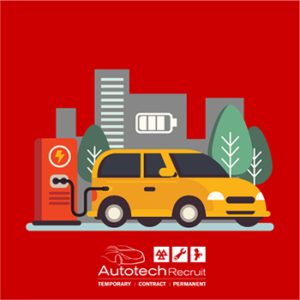By Jacob Cox, Social Media Executive at Autotech Recruit
 There has been much speculation in the news and throughout the industry over the last few years regarding the wider introduction of electric vehicles onto our roads. For so long, ‘EVs’ have been tipped as the natural progression from combustion engine vehicles in the pursuit of a greener society, the only trouble has been that none of the models put forward could compete with petrol/diesel vehicles in terms of practicality or style. When car buyers had a straight choice between a trendy hatchback Ford Fiesta or Volkswagen Polo, or the electric G-Wiz, the choice was an easy one.
There has been much speculation in the news and throughout the industry over the last few years regarding the wider introduction of electric vehicles onto our roads. For so long, ‘EVs’ have been tipped as the natural progression from combustion engine vehicles in the pursuit of a greener society, the only trouble has been that none of the models put forward could compete with petrol/diesel vehicles in terms of practicality or style. When car buyers had a straight choice between a trendy hatchback Ford Fiesta or Volkswagen Polo, or the electric G-Wiz, the choice was an easy one.
It had been speculated for a long time that electric vehicles would become more popular if they were brought into the mainstream by the biggest manufacturers, those brands have pedigree and a reputation for excellence. In the modern day, a car is as much a status symbol or accessory as an iPhone or Apple Watch, which brings us back to that choice between a trendy petrol car or a G-Wiz/Toyota Prius. Many people want a car that looks good and performs well and until recently, electric cars haven’t quite scratched that itch for many motorists.
Hybrid cars have also been around for a while now and have been gaining traction in the UK market. Hybrid cars present a sort of happy medium between fully petrol and fully electric vehicles and are seen by many as a good way to transition to full electric use while still reducing the impact of cars on the environment.
Some of the main reasons why motorists have decided against buying an electric car include the limited range, limited styles and choice of models and a lack of infrastructure in the UK to support EVs, with availability of charging points a crucial factor in consumers’ decisions. It is certainly clear that much more work is needed if electric vehicles are to become more mainstream in the coming years, with more investment in charging points and service centres needed across the country.
It is also crucial that garages and dealerships are equipped to work on a growing range of electric vehicles becoming available in the UK, as new technology brings with it a new set of hazards along with new skills and requirements. Training courses are readily available and Autotech Recruit’s training division, Autotech Training, provides a range of EV-related courses through its partnership with ZF Aftermarket Technical Training, details of these courses can be found here.
The cost of buying an EV is another barrier for motorists, with many costing in excess of £30,000 for a brand new car. The good news is that the UK government offers a £4,500 grant towards all new EV purchases in order to encourage more people to buy them, which in turn reduces the cost to the end consumer! Along with this, the growing variety and availability of EVs will see prices lower over time as consumers will have multiple classes of car to choose from.
Along with government grants, stricter regulations in big cities are set to be introduced to further reduce the number of petrol cars in our cities in order to improve air quality. The introduction of the Ultra-Low Emissions Zone (ULEZ) in London this year has been met with mixed reactions, however, London is simply following the example of numerous other cities across the world in tackling the issue of high air pollution. The link between air pollution and illnesses such as asthma and heart disease has been known for many years, and we are only just starting to take serious steps to prevent this. The ULEZ may be part of a transition to an eventual No-Emission Zone in the future, but this would only be possible once alternatively fueled vehicles are reliable enough to act as a true substitute for petrol vehicles. You can find out more about the ULEZ here.
What will be interesting over the coming years is how the industry responds to the wider introduction of EVs. With the need for sustainable mass transport becoming more necessary than ever in 2019 with ongoing climate crises and regulations, it’s vital that manufacturers do everything they can to make EVs as attractive to consumers as conventional petrol cars.
